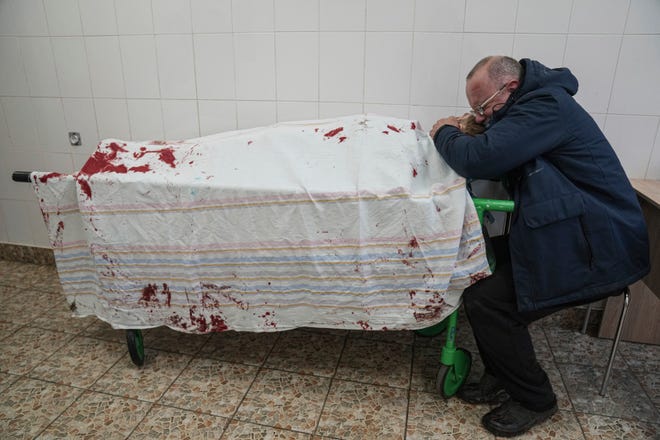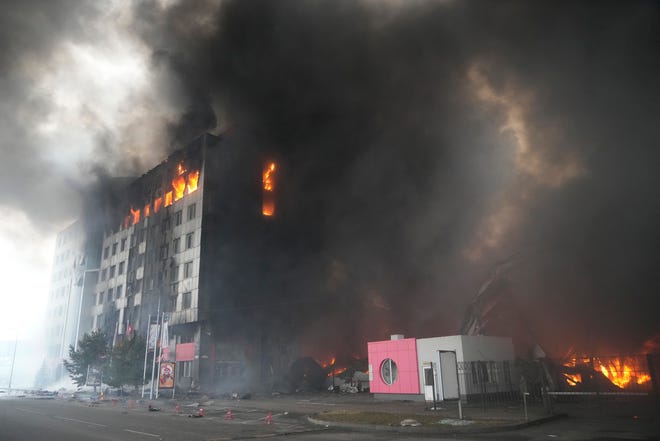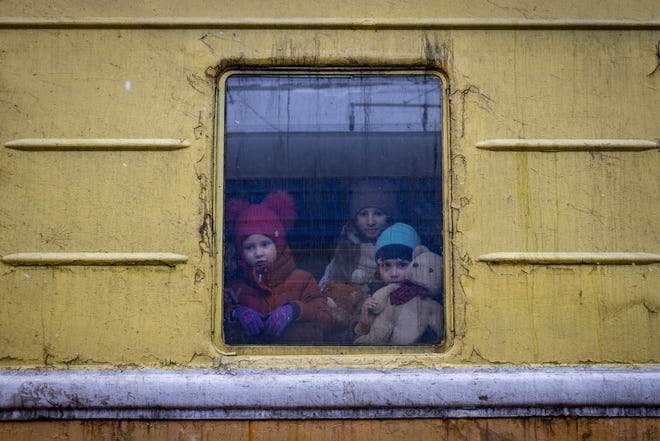Casualties were climbing on both sides and a second round of negotiations began Thursday as Russia’s ferocious assault on Ukraine entered a second week.
Officials were meeting in Belarus, where Ukrainian delegation member David Arakhamia said his country’s minimum goal was to agree on “humanitarian corridors” for cities being pounded by missiles, the Kyiv Independent reported. Russian President Vladimir Putin has demanded Ukraine accept “demilitarization,” declare itself neutral and drop its bid to join NATO.
Earlier Thursday, French President Emmanuel Macron spoke by phone with Putin for 90 minutes and now believes “the worst is yet to come,” a Macron aide told France24. Putin reportedly vowed to conduct an “uncompromising fight” in Ukraine.
Russia has acknowledged that nearly 500 of its troops have been killed in the fighting and about 1,600 wounded. Ukraine, which has not released casualty figures for its own armed forces, has estimated Russian troop losses at up to 9,000.
Quick links:
GET THE LATEST UKRAINE UPDATES:We’ll email you the latest news once a day.
ON THE BORDER:Ukrainian refugees describe harrowing journey to Poland
MAPPING AND TRACKING RUSSIA’S INVASION:See the latest on troop movements
Ukraine’s State Emergency Service has said more than 2,000 civilians have died, though it was impossible to verify the claim. The U.N. human rights office said it had recorded 227 deaths, including 15 under the age of 18, and 525 injured, since the start of the invasion on Feb. 24.
Most major cities are under siege, and southern cities along the Black Sea and Sea of Azov were primary targets as Russia’s campaign threatened to cut off shipping. Gov. Hennadiy Lahutasaid the government building in the Black Sea port city of Kherson, with a population of almost 280,000, was seized by Russian troops. Units were also bearing down on Mykolaiv, 40 miles to the northwest and home to almost half a million Ukrainians, The New York Times reported.
The Ukraine military said Thursday that four large landing ships and three missile boats were moving through the Black Sea in the direction of the Ukrainian port city of Odesa and its 1 million residents. Russian sailors were firing on civilian ships and taking prisoners, according to the military.
Russian forces failed to capture Mariupol, a city of 450,000 on the Azov Sea and had “resorted to a blockade, creating a humanitarian disaster,” the Ukrainian military said. Food, water and even electricity have been cut off, women and children halted from evacuating.
Latest developments:
►Swedish do-it-yourself furniture maker IKEA said it has paused all export and import in and out of Russia and Belarus.
►In a stunning reversal, Russian and Belarusian athletes have been banned from the Winter Paralympic Games for their countries’ roles in the war in Ukraine, the International Paralympic Committee said Thursday in Beijing.
►A South Korean pharmaceutical company manufacturing Russia’s COVID-19 vaccine says it’s bracing for business complications as the U.S.-led West escalates sanctions against Russia.
►About 3,800 troops based at Fort Stewart in southeast Georgia have been ordered to deploy quickly to bolster U.S. forces in Europe.\
A CLOSER LOOK AT SANCTIONS:Where US, allies have targeted the dozens of sanctions against Russia
1 million have fled in ‘swiftest exodus this century’
More than 1 million people have fled the fighting. The mass evacuation could be seen in Kharkiv, where residents desperate to escape falling shells and bombs crowded the city’s train station and pressed onto trains, not always knowing where they were headed. The Ukrainian government said at least 34 people were killed and 285 injured, including 10 children, during the shelling of Kharkiv.
In one week, more than 2% of Ukraine’s population has been forced out of the country, according to a tally from the United Nations, which called the mass flight one of the “swiftest refugee exodus this century.”
Putin siege tactics could bring mass destruction, death to Ukraine
Putin’s military forces seem poised to adopt siege tactics that could result in enormous civilian deaths and infrastructure damage after their initial assault has failed to topple the Ukrainian government, officials and experts say. The Ukrainian cities of Kyiv, Kharkiv and Mariupol have come under heavy bombardment from airstrikes and artillery – similar to Putin tactics in Syria and Chechnya.
“A siege is likely and may last as long as several weeks,” said Sen. Richard Blumenthal, D-Conn., a member of the Armed Services Committee. “He’ll try to wear down resistance in Kyiv and Kharkiv and other major cities, hitting civilian centers with massive explosives, airstrikes and missiles.” Read more here.
– Tom Vanden Brook

Putin nuclear talk sparks run on iodine pills
Fighting in the vicinity of the former Chernobyl nuclear reactor in Ukraine followed by news Sunday that Russian President Vladimir Putin had put his nuclear arsenal on alert has prompted a rush on iodine in some European countries. In Belgium, Pharmacists’ Union’s Michael Storme told the press agency Belga that druggists there had given away 30,000 packs of iodine tablets Monday alone. Some pharmacies in Finland were running out of iodine tablets, which can protect your thyroid gland from the effects of radiation.
The U.S. Nuclear Regulatory Commission notes that it is a “very specialized protection” and says evacuations is the most effective measure because it “protects the whole body from all radionuclides and all exposure pathways.”
Zelenskyy: Russian soldiers are ‘confused children’
In a video address to the nation early Thursday, Ukrainian President Volodymyr Zelenskyy called on Ukrainians to keep up their resistance but didn’t comment on whether the Russians have seized any cities.
“They will have no peace here,” Zelenskyy said, calling on the Russian soldiers to “go home” and describing them as “confused children who have been used.” He said that for Ukrainians this was a patriotic war that won’t end until the Russians have been driven out.
“Wherever they go they will be destroyed,” Zerenskyy said. “They will not have one quiet moment. The occupiers will receive only one thing from Ukrainians – resistance. Fierce resistance.”
Black and brown refugees are being turned away at European borders
As growing number of reports suggest people of color fleeing Ukraine are facing discrimination at the border, the crisis has once again clarified the double standard in the way nations treat refugees based on country of origin, race, religion and more, academics and refugees say.
Many of the same European nations that turned away refugees from the Middle East, Africa and Asia in the past are now largely welcoming refugees from Ukraine.
“It’s great that Europe is being welcoming toward Ukrainian refugees. That should be the response. But it would be even better if that response was applied across the board toward all refugees who are fleeing persecution and war,” said Nell Gabiam, an associate professor at Iowa State University who studies forced migration.
There have been “unfortunate reports” of Ukrainian police and security personnel refusing to allow Nigerians to board buses and trains heading toward the Ukraine-Poland border, the office of the president of Nigeria said in a statement Sunday. Dozens of citizens of African nations have offered similar accounts to news outlets worldwide. Polish officials, however, have dismissed claims of unfair treatment.
Filippo Grandi, United Nations High Commissioner for Refugees, commended governments and citizens for their “extraordinary acts of humanity and kindness” but acknowledged some refugees have faced “a different treatment” at the border. Read more here.
– Grace Hauck

US colleges denounce Russia, pull out of country
Some American colleges are joining the growing Western coalition of governments and businesses taking action against Russia – an unusual position for the academy, which generally tries to stay out of international politics.
The response from U.S. universities has ranged from denouncements of Russia’s actions to shutting down academic partnerships and programs in Russia.
The Massachusetts Institute of Technology has taken the most drastic steps in the academy, severing ties with a Russian university it helped to found. And on Monday, the Department of State urged all Americans to leave Russia, which could affect collegians studying abroad.
The developments are especially striking given that universities celebrate their openness to cultural exchange, even with controversial governments such as China or Saudi Arabia. But Russia’s invasion of Ukraine is testing how far the commitment to intellectual diversity can go in the face of war. Read more here.
– Chris Quintana
WHO: ‘Much more likely’ COVID will spread in Ukraine now
The World Health Organization said Wednesday that the ongoing invasion of Russian forces in Ukraine will allow COVID-19 to spread easily across the country, concerning health officials that the situation will result in many cases going undetected as attacks are made on healthcare facilities.
“You disrupt society like this and literally millions of people on the move, then infectious diseases will exploit that,” Mike Ryan, director of the World Health Organization’s Health Emergencies Program, said during a news briefing. “(People are) highly susceptible to the impacts of, first of all, of being infected themselves, and it’s much more likely that disease will spread.”
Ukraine is coming off one of its worst waves of COVID-19 since the pandemic began, according to WHO data.
On Feb. 4, there were a record 43,778 positive cases reported, and although cases have continuously declined since then, the crisis could result in the virus easily spreading without tests available. Only 34% of the country’s population is fully vaccinated, according to WHO data.
– Jordan Mendoza
Biden banned Russia from US airspace. Here’s what the area covers.
President Joe Biden announced the U.S. is closing off airspace to all Russian flights during his State of the Union address on Tuesday, a decision with a sprawling geographic impact because of the numerous territories in the Pacific Ocean.
The move is a part of a global effort aimed at isolating Russia from the rest of the world. Cutting off Russian flights to the U.S. will impact airspace over the lower 48 states, Hawaii, Alaska and the American-controlled territories that expand across much of the Pacific Ocean.
Those territories include Palau and the Marshall Islands. And under the Compacts of Free Association, a series of treaties between the United States and those territories, the U.S. has access to and controls much of the airspace surrounding the islands.
– Celina Tebor

Report: China asked Russia to delay Ukraine invasion after Olympics
Senior Chinese officials told Russian officials back in February not to invade Ukraine before the end of the Winter Olympics in Beijing, The New York Times reported Tuesday.
The Times, citing a Western intelligence report and quoting senior Biden administration officials and a European official, said that the Chinese officials had “some level of direct knowledge about Russia’s war plans or intentions” before the invasion started last month.
Chinese President Xi Jinping met with Russian President Vladimir Putin in Beijing on Feb. 4 before the Winter Games kicked off in Beijing. According to the Times, it’s not clear if conversations about the invasion took place in the meeting between Xi and Putin.
After their meeting last month, both leaders issued a joint statement highlighting what they called “interference in the internal affairs” of other states, as Xi and Putin faced criticism from the United States over their foreign and domestic policies.
The relationship between China and Russia has grown over the past few decades, and the two nations opposed a further expansion of NATO. When Russia began its full-scale invasion of Ukraine on Feb. 24, China called for peace between the two countries and said the U.S. and its allies were worsening the conflict.
– Charles Ventura, Asha C. Gilbert
Contributing: Associated Press

